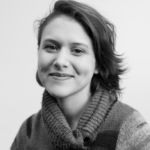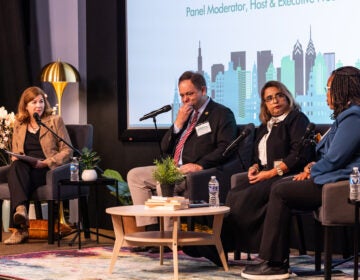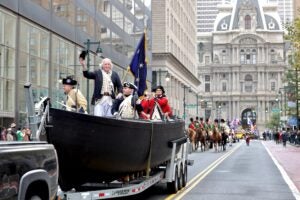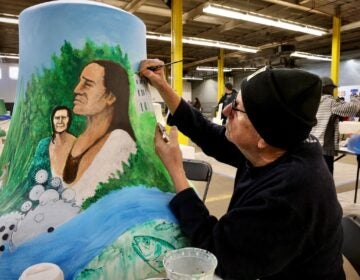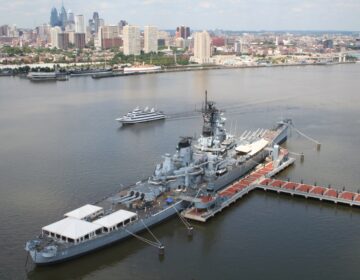A 2026 dinner series will ask native-born, immigrant Philadelphians to talk about citizenship
The semiquincentennial event will reach more than 1,000 Philadelphians in seven of the city’s most diverse neighborhoods.
Listen 1:48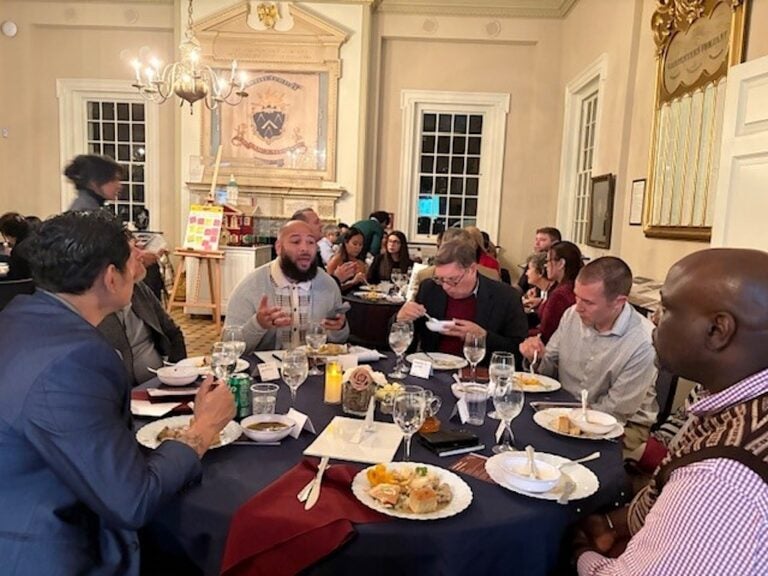
The Welcoming Center is hosting a series of community dinners, called "Breaking Bread, Breaking Barriers: The Citizenship Project" in 2026 to spark discussion about what it means to be a citizen. Two pilot dinners for the program were held in November 2025. (Courtesy of The Welcoming Center)
From Philly and the Pa. suburbs to South Jersey and Delaware, what would you like WHYY News to cover? Let us know!
The Welcoming Center is launching a dinner series in 2026 to bring together native-born and immigrant Philadelphians to talk about what it means to be a citizen.
“Breaking Bread, Breaking Barriers: The Citizenship Project” will be part of the city’s Semiquincentennial celebrations.
“What I’ve seen time and time again with this project is that when we get people talking about food and discovering one another through food … we lower the temperature,” said Anuj Gupta, president and CEO of The Welcoming Center. “We start to mitigate whatever assumptions they might have had about one another. And we create this comfort zone.”
What is the program and how did it start?
Gupta started “Breaking Bread, Breaking Barriers” in 2016 as general manager of Reading Terminal Market.
Inspiration for the program came from sociologist Elijah Anderson’s book, “The Cosmopolitan Canopy,” which focused on five public spaces in Philadelphia and “foods-powered act as one of our last common denominators,” Gupta said.
“No matter where you’re from, no matter how much or how little money you have, no matter what language you speak, what religion you practice, etc., where you live, everyone has a cuisine that is a repository of their communities,” he said. “Not just ingredients, but stories and history and values.”
Those initial versions of the dinner series focused on discussions around food, but later editions delved into other topics, including neighborhood parks, Gupta said.
The 2026 series, hosted by The Welcoming Center, will implement the program on the largest scale yet, with a goal to involve more than 1,000 Philadelphians.
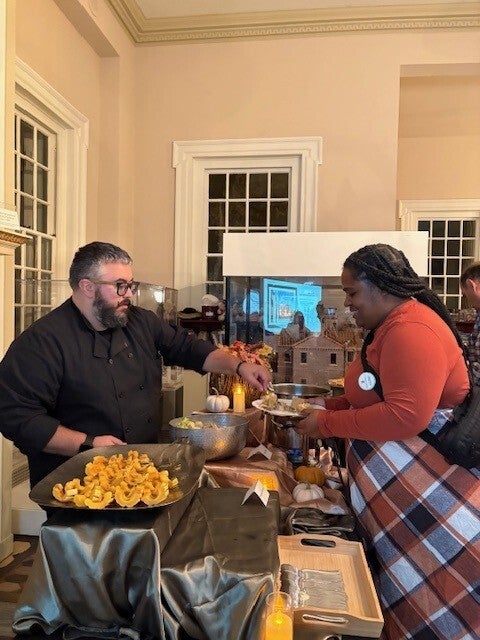
Gupta said the “Breaking Bread” model has been replicated in other parts of the country. He said he’s witnessed firsthand how sharing a meal and talking about food can serve as a gateway to deeper conversations.
“I have seen people say things to a table of total strangers that I never would have expected,” he said. “Which I think is attributable to … that power of food to break through these barriers and make people feel comfortable with one another, but coupled with that, is a yearning for human connection, because the time that we live in is so stratified by our technology.”
An in-person conversation, especially over food, is a way to break out of the polarizing discourse often found on social media platforms.
“I think people actually want something better than that,” Gupta said. “And when we give them a forum to find it, they lean into it.”
What will be the focus of the 2026 ‘Breaking Bread, Breaking Barriers’?
In the 2026 edition of the program, participants will first discover what they have in common through food-based methodology, and then engage in conversations about what it means to be a citizen, as defined by the rights and responsibilities of all city residents.
“The hope is that we leave behind a set of principles, a set of covenants, however you want to refer to it, that not only we put into practice here in Philadelphia, post 2026,” Gupta said, “but as other cities, other states, frankly, other countries continue to grapple with what is probably the largest human migration in the history of the world … we come to see some contemporary understanding of what citizenship really means, not the first- and second-tier status that the government affords you when they classify you as a citizen or noncitizen.”
Gupta said those conversations echo the focus of semiquincentennial celebrations that will examine the role Philadelphia played in shaping the nation’s roots and ideals.
“Just like 250 years ago, we gave the rest of the world some thought leadership on what this notion of democracy could be. The idea is to give the world some thought leadership on what citizenship can be,” he said.
Gupta said talking about citizenship across immigration status is particularly important now, as the Trump administration has increased immigration enforcement.
“If we don’t talk about it and we don’t form connections about it, then everything that is being said and done to further divide people, particularly along these lines, the state definition of citizenship,” he said, “that narrative wins.”
Philadelphia’s foreign-born population has grown significantly since the early 2000s, with immigrants now making up the highest percentage of the city’s population since the 1940s.
“It’s happened organically and it’s happened intentionally,” Gupta said. “It’s happened because of work by organizations like The Welcoming Center. It’s happened because change in posture and policy by mayors and city councils and business leaders. But it’s also happened because people have either subconsciously or consciously adopted a set of principles about how they want to live, how they want to see their communities, how they want to treat their neighbors. And my hope is that this, in some ways, codifies what we’ve seen transpire in Philadelphia over the last two decades, because Philadelphia is a poster child of how immigration can benefit everybody.”
The 2026 series is funded by the city of Philadelphia, The Philadelphia Funder Collaborative for the Semiquincentennial and the William Penn Foundation.
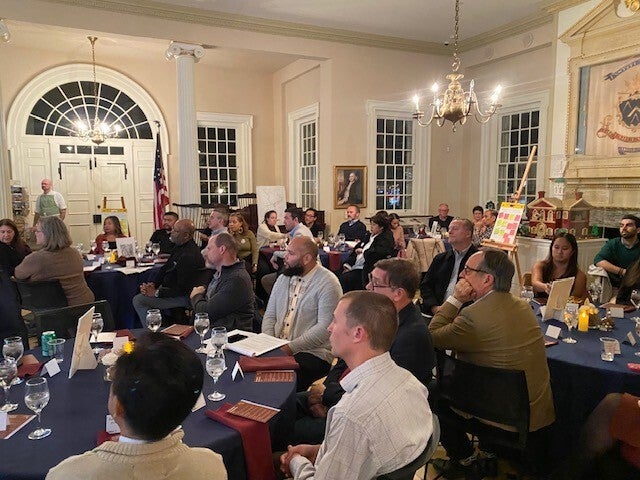
When and where is it happening?
Seven diverse neighborhoods in Philadelphia will host a series of three dinners each between January 2026 and late summer 2026.
The seven zip codes for the project — located in Southwest Philadelphia, West Philadelphia, South Philadelphia, Northeast Philadelphia and North Philadelphia — all have a high percentage of native-born and foreign-born residents.
Community partners and organizations in each neighborhood will work with The Welcoming Center to recruit participants, host the dinners and ensure language access for all attendees.
A final collective dinner will be held for all of the more than 1,000 participants. Gupta said he would like to host that event at Independence Mall in September or October 2026.
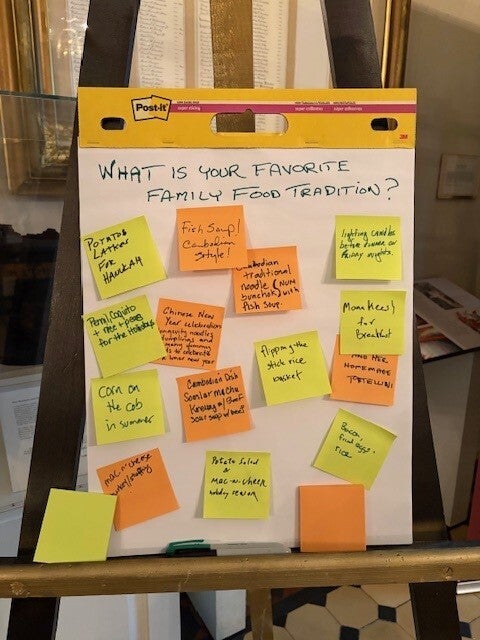
How to get involved
Anyone interested in participating in the dinners or learning more about the project should check on The Welcoming Center’s website and social media profiles. More than 20 community partner organizations will also be releasing information in the coming months about the dinners.
“If folks are interested in getting involved, once we start to set the dates and the venues, they should reach out to the partner organizations in those communities,” Gupta said.

Get daily updates from WHYY News!
WHYY is your source for fact-based, in-depth journalism and information. As a nonprofit organization, we rely on financial support from readers like you. Please give today.


